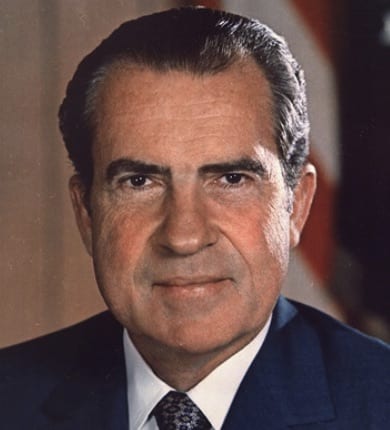
Richard Milhous Nixon was born on January 9, 1913, into a poor family of Quakers in Yorba Linda, California. In 1937, at the age of 24, he graduated from Duke Law School and established his law practice in California. In 1942, he moved with his wife, Pat (née Ryan) to Washington, DC to work for the federal government. After serving in the Naval Reserve during World War II, he was elected in 1946 to the House of Representatives. He rose to prominence as a Republican congressman and in 1950 he was elected to the senate, having gained national attention for his involvement in the conviction of Alger Hiss, who was spying for the Soviet Union. Nixon became a household name in the United States when he became Dwight D. Eisenhower’s running mate in the 1952 presidential election. During his tenure as Vice President, he was known for his tough stance against communism and for his involvement in foreign affairs.
In 1960, Nixon narrowly lost the presidential election to John F. Kennedy. However, he continued to be active in politics, winning the Republican presidential nomination in 1968, and becoming in 1969 the 37th President of the United States. Nixon’s administration saw significant domestic reforms, including the establishment of the Environmental Protection Agency (EPA) and initiatives such as desegregation and affirmative action.
Internationally, Nixon pursued a policy of détente with the Soviet Union and in 1972 he opened diplomatic relations with China, signalling a significant shift in U.S. foreign policy. In that year, he was re-elected by a landslide for a second term In 1972 defeating the Democratic candidate George McGovern, he ended American involvement in the conflict in Vietnam and the military draft. In spite of these achievement, his presidency was marred by the Watergate scandal, that led to his resignation in 1974. The scandal involved an attempted cover-up of a break-in at the Democratic National Committee headquarters during the 1972 election. Nixon’s resignation made him the first and, to date, only U.S. president to resign from office.
After leaving the presidency, Nixon retired to California and focused on writing his memoirs and articles on foreign policy. He published several books and gradually began to rehabilitate his image through interviews and foreign policy advice. Nixon passed away on April 22, 1994 from complications resulting from a severe stroke. Despite his accomplishments in foreign policy and domestic affairs, the Watergate scandal remains a significant aspect of his legacy.
